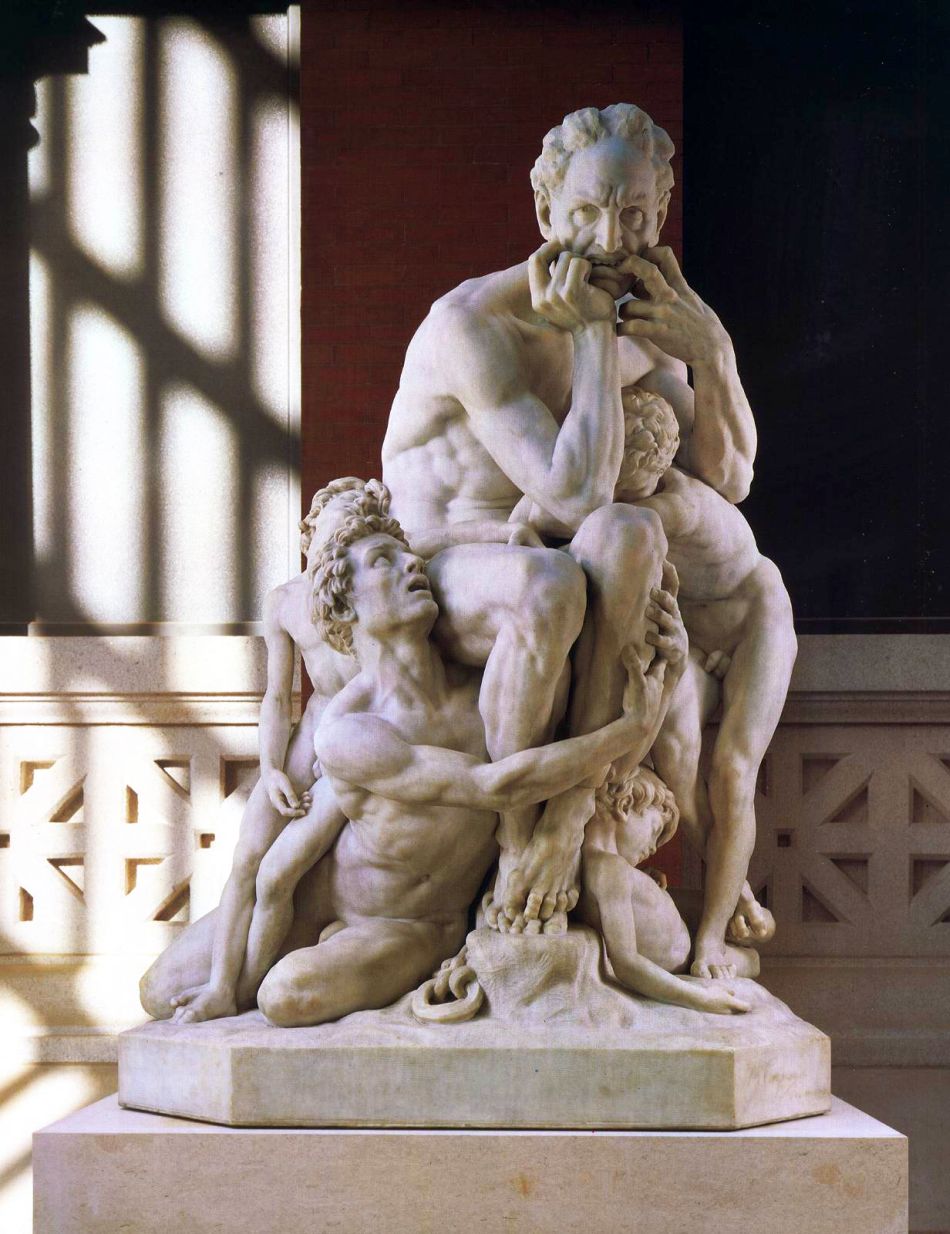DAWN
Daily Arts Web Nucleus
Discover the Arts! Each day a different image from the Literary, Performing, or Visual Arts representing a portion of Scripture plus an explanation with links 2015 February 15
Ugolino and His Sons (1865-1867)
Jean-Baptiste Carpeaux (1827-1875)
Baroque Style
Metropolitan Museum of Art, New York, New York, USA
Image Source: Web Gallery of Art
Explanation: In Psalm 14 David describes the nature of those who are morally foolish. The Psalm would fit the time of the Exile when Israel was in bondage to a godless nation, except for the fact that it was apparently written by David, according to the superscription. But the reference to captivity would also apply to a time of persecution and danger for God's people such as those by Saul or by Absalom, both of whom troubled Israel during their time of rule. Among other things, in the Psalm below, the wicked are described (figuratively) as cannibalistic towards God's people. Today's image is of a starving father who is horrified by his thoughts of cannibalism which arise in his heart toward his own children. It is a horror that should be shared, but is not, by those who afflict the people of God.
[ THEMATICALLY AND CHRONOLOGICALLY RELATED SCRIPTURES: Psalm 53:1-6. 1 Samuel 19-31. 2 Samuel 15-18. ]
[ CHRONOLOGY: General. Patriarchs (Traditional). Judges # 1. Judges # 2. Kings # 1. Kings # 2. Prophets # 1. Prophets # 2. NT # 1. NT # 2. NT # 3. ]
[ MAPS: Maps # 1. Maps # 2. Maps # 3. Maps # 4. Maps # 5. ]
[ COMMENTARIES, ETC: GENERAL: Bible Study Tools; Bible Hub: Study Light; Blue Letter Bible // PSALMS: Monergism: Precept Austin: The Treasury of David; John Gill; John Calvin - Volumes 1, 2, 3, 4, 5]
[ MUSIC: GENERAL: The Cyber Hymnal // PSALMS: Genevan Psalter (Instrumental). Psalm 14 - #1. Psalm 14 - #2. Psalm 14 - #3. ]
David begins with a description of the fool: "The fool has said in his heart, There is no God." This last phrase can be translated, "has said in his heart, No God," or by implication, "No God (or gods) to me." And, depending on the derivation of "no" ('ayin), the phrase could be translated "Where (is) God." In all of these translations, the underlying idea is that a fool rejects God, whether he believes in him or not. The result is corruption, abominable works, and an absence of worthy behavior (1). In confirmation of this assessment, God looked down from heaven to see if there were any who had understanding or who did good (2). He found none. All of them had turned aside, and had become filthy. None did good. No, not one (3). This lack of goodness manifested itself by the way they treated God and God's people. They figuratively "ate" God's people like bread. They refused to call on God (4). In spite of their self confidence, they (meaning the enemies of God and of his people) were in great fear (or fearful alarm) when they realized (by some demonstration of favor) that God is among those who are righteous (5). Then, addressing the wicked directly, David tells them that they have shamed (or scorned) the counsel of the poor because the poor consider the LORD to be their refuge (6). Nevertheless, David reasserts his confidence in the LORD by praying for deliverance and by noting that when the LORD delivers his people they will rejoice and be glad (7).
THE PSALTER:
BOOK ONE OF FIVE:
Psalms 1-41.
Psalm 14
A Psalm of David.
The fool hath said in his heart, There is no God.
They are corrupt,
they have done abominable works,
there is none that doeth good.
2 The LORD looked down from heaven upon the children of men,
to see if there were any that did understand,
and seek God.
3 They are all gone aside,
they are all together become filthy:
there is none that doeth good, no, not one.
4 Have all the workers of iniquity no knowledge?
who eat up my people as they eat bread,
and call not upon the LORD.
5 There were they in great fear:
for God is in the generation of the righteous.
6 Ye have shamed the counsel of the poor,
because the LORD is his refuge.
7 Oh that the salvation of Israel were come out of Zion!
when the LORD bringeth back the captivity of his people,
Jacob shall rejoice,
and Israel shall be glad.
* NOTE: On Opening and Closing Comments in the Psalms.
[Some commentators take the Psalm in Habakkuk 3 to be a standard model for the Psalms.
Habakkuk's Psalm begins with the name of the composer ( Habakkuk) and a musical notation (" upon Shigionoth").
It closes with a dedication or a " send to" notice (" To the chief singer on my stringed instruments").
I have arranged similar material, where it is found in the Psalter, in accord with the model in Habakkuk.]
ADDITIONAL AD LIB MATERIAL: Prose, Poetry, Writers, Visual Artists, Music, DAWN, and ILLUMINATION. ILLUMINATION features a compact, Illuminated Bible. DAWN, the page you are presently visiting, features a new image and explanation daily.
Please Email Comments and Questions To
AD LIB ARTS EMAIL
copyright 2014, Scott Souza
|
